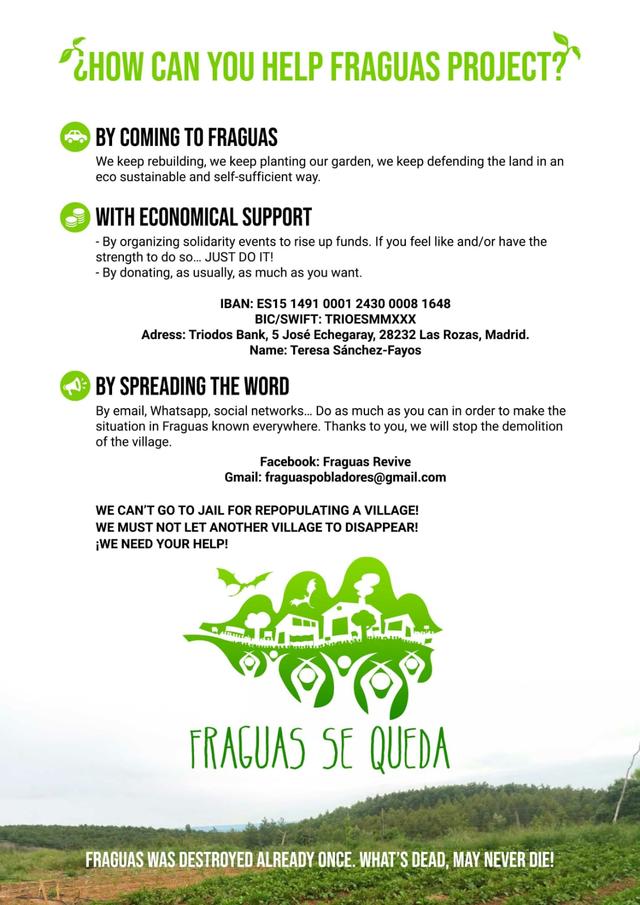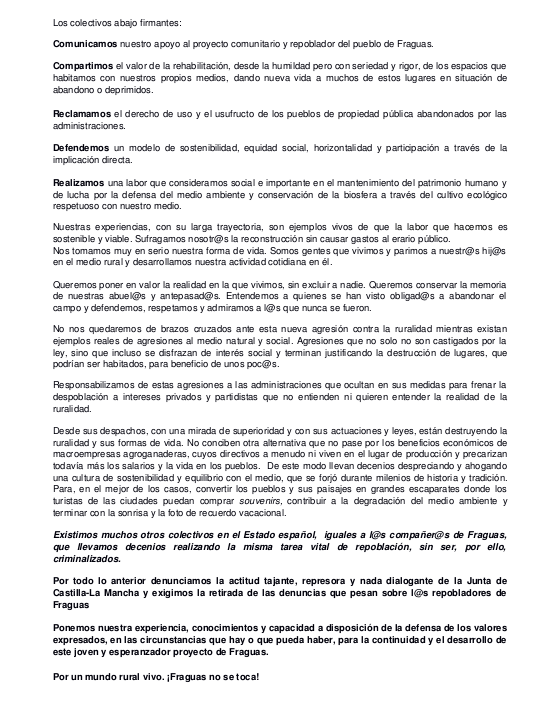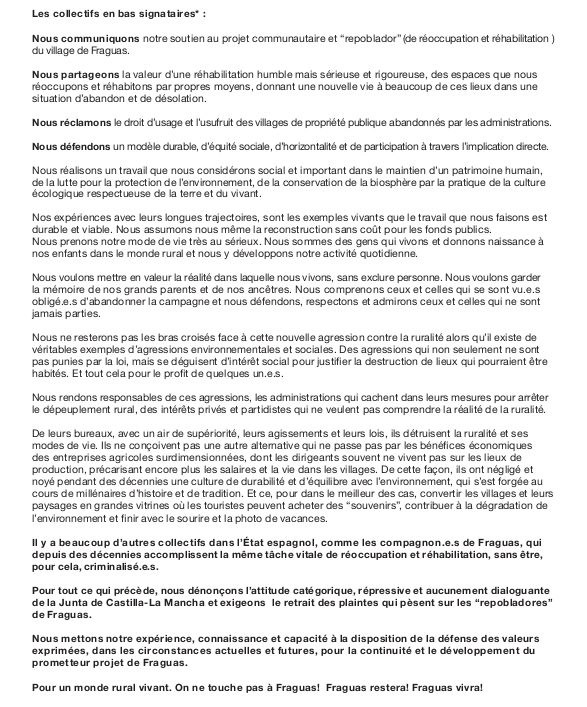

Support the rural occupation in Fraguas, Spain
Wanneer: 10/09/2018 - 17:14
Fraguas is a project of communautary rural renovation in the mountains in the north of Guadalajara (Spain). Since spring 2013, a group of humans, the Association of rural inhabitants of the northern mountain, are rebuilding the ruins of the ancient village, based on agro-ecological values, on collective self-governance and the will of opening new living spaces in a zone which suffers a lot from abandoning.



During last years, they have been cleaning the streets and the paths, maintaining the fruit trees, rebuilding houses, improving the entrances and the water network from the springs... They have strenghtened the relationships with the surrounding villages at the same time as they were making the project growing and getting stronger with the help of numerous united persons.
The local council community of Castilla la Mancha is the owner of the mountain where is situated the village. During a short term of exchanges about the multiple possibilities that have been shared with the group of brave young ones, the local council community started a judicial process aiming to depopulate and demolish again Fraguas and to punish the new occupants (24 years of jail's sentence and 63 500 euros's fine).
Until today, the new occupants, full of dignity and hope, have kept working in the village, and have initiated a campaign of defense in order to keep Fraguas being a place where can meet the ancient savoir-faire and the future's utopias ; where action make the doubt vanish and the hope be alive ; where people fit in their personnal, social and global ecosystem with respect.
We encourage you to visit the project (fraguaspobladores@gmail.com) and help spreading the information.
Attached files :
- How to help the occupation of Fraguas
- The manifesto for Fraguas : we, different collectives and rural associations, have written a text to support the comrades of the occupied village of Fraguas with whom we feel that we are close on many aspects. This text is part of a campaign with which, we, collectives, associations, etc..., give our support and demand to gain access to the land and to that chosen way of life. Therefore, we are against the penalization of our comrades. Please take the time to read the manifesto. To make it having more impact, it is important that you send back that document signed and scanned.
File: manifeste pour fraguas.pdf

https://www.theguardian.com/world/2017/jun/06/fraguas-spain-ghost-villag...
theguardian.com
Fraguas: the revitalised Spanish village officials now plan to demolish | World news
Sam Jones
7-9 minutes
A cuckoo calls in Fraguas, its two-note song echoing through the pines, around the village’s ruined church and along the weed-choked rockeries that once were streets.
Until four years ago, there were only hunters and hikers to hear the birds sing. But today, almost five decades after the last inhabitants left, Fraguas is slowly and controversially stirring back to life.
Brick by brick and stone by stone, a collective of young settlers is rebuilding the village in the hills of northern Castilla-La Mancha. The houses that were home to 80 people are being put back together, solar panels have sprung up and a kitchen garden is planted with chard, onions, courgettes and tomatoes.
Their aims are simple: to leave behind the grime and expense of Madrid, 90 minutes’ drive away, live sustainably and responsibly, and rekindle an extinguished community.
On a blackboard hanging outside the shared kitchen, visitors and residents are reminded that even bucolic retreats have rules.
Look after your surroundings, clean up your shit and don’t leave fag ends on the ground. There’s a lot to do, so join one of the work crews.
That may be putting it mildly. Since the village was emptied to make way for a reforestation programme in the late 1960s, Fraguas, in Guadalajara province, has been transformed by nature’s persistent creep and, more drastically, a spell as a training area for Spanish soldiers, during which houses were blown up.
The greatest obstacle to its rebirth, however, is neither weeds nor bomb damage.
Despite acknowledging the need to bring young people back to one of Spain’s most sparsely populated areas, the regional government has said the collective cannot stay in the village, which lies in public woodland within the Sierra Norte natural park.
Legal proceedings have been initiated and six members of the collective could face fines, more than four years’ imprisonment each and a €26,000 (£23,000) bill to demolish what they have built since 2013.
Jaime Merino, 24, one of the settlers, said: “There’s a certain resistance to this kind of project in this country.
“They always say they’re going to take steps to tackle depopulation and find ways to get people back into rural areas, but this is an example of that. That’s the paradox: it’s Guadalajara’s department of agriculture, the environment and rural development that wants to demolish the village.”
The collective is retaliating with a petition that has attracted more than 60,000 signatures and an appeal for contributions to its legal fund.
Equally important is the support it has received from Fraguas’ former inhabitants.
Rafael Heras was born in the village 71 years ago, one of the many babies to arrive after the bloody pause of the civil war. He remembers the village as a simple and self-sufficient place where most people grew crops or had sheep and goats.
“There was no electricity and no proper road; we used to keep it clear so that cars could come through,” he said. “It wasn’t a prosperous place, but I had a happy childhood here and people got by quite well.”
He left Fraguas aged 19 to work in a factory in Madrid, a few years before the villagers were bought out.
“They gave us 3 million pesetas in the 1960s for the village and all the land, which was a pittance. That would be cheap now even if it were €3m,” he said.
The Heras family home was the first blown up by the soldiers and, over time, the small cemetery where his mother is buried was swallowed up by weeds. The newcomers have cleared the path leading to the graveyard, cleaned the headstones and rebuilt some of its walls.
“I’m happy to see the village being restored and I’d like to see it come back to life,” Heras said. “And I’d like to have a summer home here, but I reckon that won’t be possible.”
Another former resident, Isidro Moreno, wrote a guide to the village, filled with maps, plans and photos, to help the collective put it back together.
“To the new residents of Fraguas,” it begins. “Let’s see if you can recover this village’s history once more … I want to remind you to treat these stones with the love and respect they deserve, even if today they’re dead and lost among brambles and weeds. In another time, they were alive and were part of the story of the people who struggled so hard to live and who went through so many calamities.”
Alberto Rojo, the regional government’s representative in Guadalajara province, said while authorities recognise the need to repopulate the Spanish countryside, the law must be upheld. There are, he added, more than 200 living villages in the region that have fewer than 50 inhabitants and which would welcome more people.
“Of course we agree that there needs to be repopulation initiatives in the province – and let’s hope there will be many – but only in the right kind of places,” he said.
The area, Rojo added, is a natural park, protected by law, where there is a risk of forest fires.
Merino dismissed such arguments as absurd and said the collective has reduced the risk of fires by cleaning up rubbish and dead wood, and refilling a disused water cistern. He said it has offered to dig firebreaks around the village free of charge.
Merino and his friends are hoping the case will be dropped before it reaches court. If not, they are relying on public support and the testimony of Heras and other former residents.
Buoyed as they are by the petition and financial support, they remain puzzled by the notion of being made to pay for the destruction of the hamlet they have worked so hard to rebuild.
“Maybe we’ll become the first village in Spanish history to be demolished three times,” said Merino. “That wouldn’t surprise me in this country.”
[spam deleted]